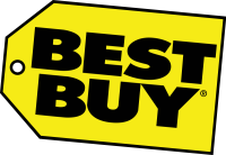 Best Buy image.
Best Buy image. But if I want a wide variety of laptops to select from – at least in Piedmont North Carolina, there is no choice other than to frequent Best Buy, or one of the office boxes.
So there we were, two somewhat older, would-be Best Buy customers wandering around trying to figure which laptop from a mind-numbing array of choices would best suit my wife. Within minutes, a young guy in a blue Best Buy shirt appeared, briefly inquired about our needs and said he’d find someone to help us out – a positive start! Then he (and apparently his helper) … disappeared. Later, after having selected an HP laptop totally on our own, he approached us again as we sauntered over to the camera department and went through the same routine again, not realizing that he had spoken to us fifteen minutes earlier.
In the camera department, I asked another blue-shirt about a specific Canon product that they were likely to have in stock considering the price range of cameras already on display. “No,” the clerk said. “We don’t have that one.” He wandered off.
Hmmm …
Then I turned around, and there – at eye level on an end cap display – was the camera I’d inquired about in all its promotional glory!
The clerk came back. I pointed out the display. He seemed genuinely shocked. Then said that the camera department “expert” would be back from lunch in a few minutes and that we should hang around and talk to him. We did. He didn’t. After a while, the clerk returned with news that the expert wasn’t actually working that day and that we should come back during the week.
Hmmm …
So on to checkout. Only one register open, and there was a line. After a while, it was our turn. The young woman behind the register acted bored beyond hope and asked far too many pre-programmed questions, which was one reason the line moved so slowly. After completing our single-item transaction, her final note of disdain was to mutter “Thank you, have a great day” in a tone that made me want to dope-slap her (or her manager, or his/her manager, or the president of the company).
One miscue I can handle, but five?
1. The disappearing greeter, Part I.
2. The disappearing greeter, Part II.
3. The uninformed camera clerk.
4. The missing expert.
5. The disappointing checkout.
HEY BEST BUY People, IT SHOULDN'T Be That Difficult!
Best Buy Takes Off.
But pervasive market change had begun chewing away at their success, including online gaming, music streaming, online merchandising and (of late) software migration to the cloud. Strategic disruptor Amazon.com sold their first book online in 1995. And reached a billion dollars by 2001. Today, they’re busily selling the everything from A-Z that Jeff Bezos envisioned from the start.
The Wachovia Personal Banker.
There were two keys to the success of Personal Banker:
(1) It maximized (and managed) the customer experience: created value by creating valuable relationships.
(2) It was authentic. Wachovia delivered on their promise, day in and day out.
But what about Best Buy? They clearly need a fresh approach, perhaps one as bold and innovative as the concept that first set them apart. However, instead of looking to selection, scope and scale (even price) for differentiation, there may be strategic ground to be gained in activating their sales culture.
Power To The People.
Transforming Best Buy’s sales culture into a high performance human asset may sound like a stretch. But even if the idea were only moderately successful, it beats the heck out of the errors, ignorance and indifference that pervaded our recent Best Buy laptop shopping experience. And it certainly would give the company a long-term competitive advantage worth shouting about.
To be fair, Renew Blue, a Best Buy performance improvement initiative designed (in part) to “reinvigorate and rejuvenate the customer experience” has been underway for just over a year. But for the moment, these two Best Buy shoppers are in no hurry to come back -- although when the new laptop breaks, we’ll be first in line to check out the Geek Squad.
TakeAway: Differentiate your business, brand or product in a meaningful and enduring way. Create value by creating valuable relationships. Reward the people who make it happen. Then tell the marketplace about your success – instead of letting it shape you. People will want to be your customers. And will return again and again.
© Brian E. Faulkner.
Related posts:
www.brianefaulkner.com/1/post/2014/01/minimum-wage-should-be-stricken-from-our-business-vocabulary.html
www.brianefaulkner.com/1/post/2014/02/mr-grumpy-gets-his-due.html
ABOUT Brian Faulkner:
Brian also is a three-time Emmy award winning Public Television writer and narrator of UNC-TV’s popular Our State magazine series, on the air since 2003.

 RSS Feed
RSS Feed